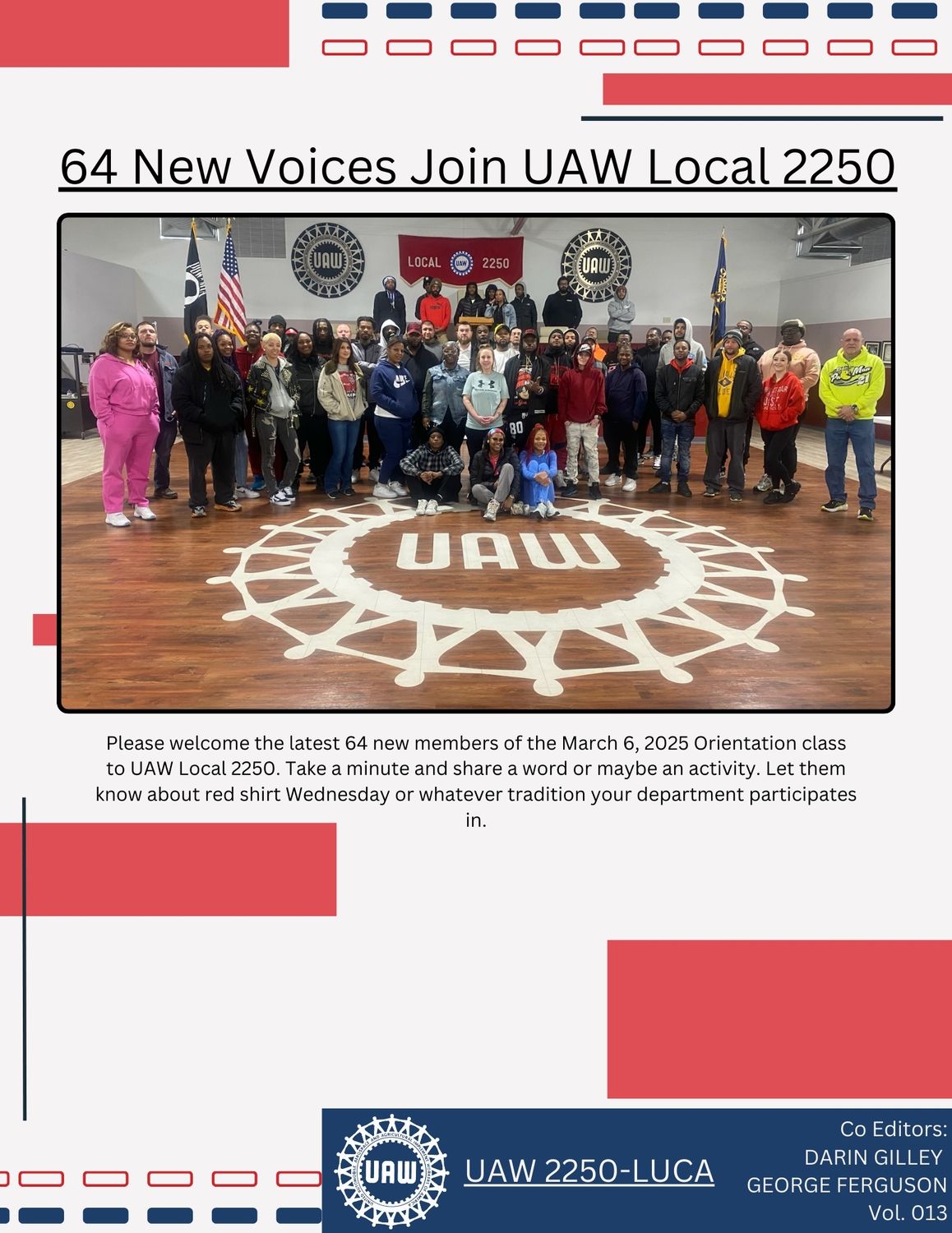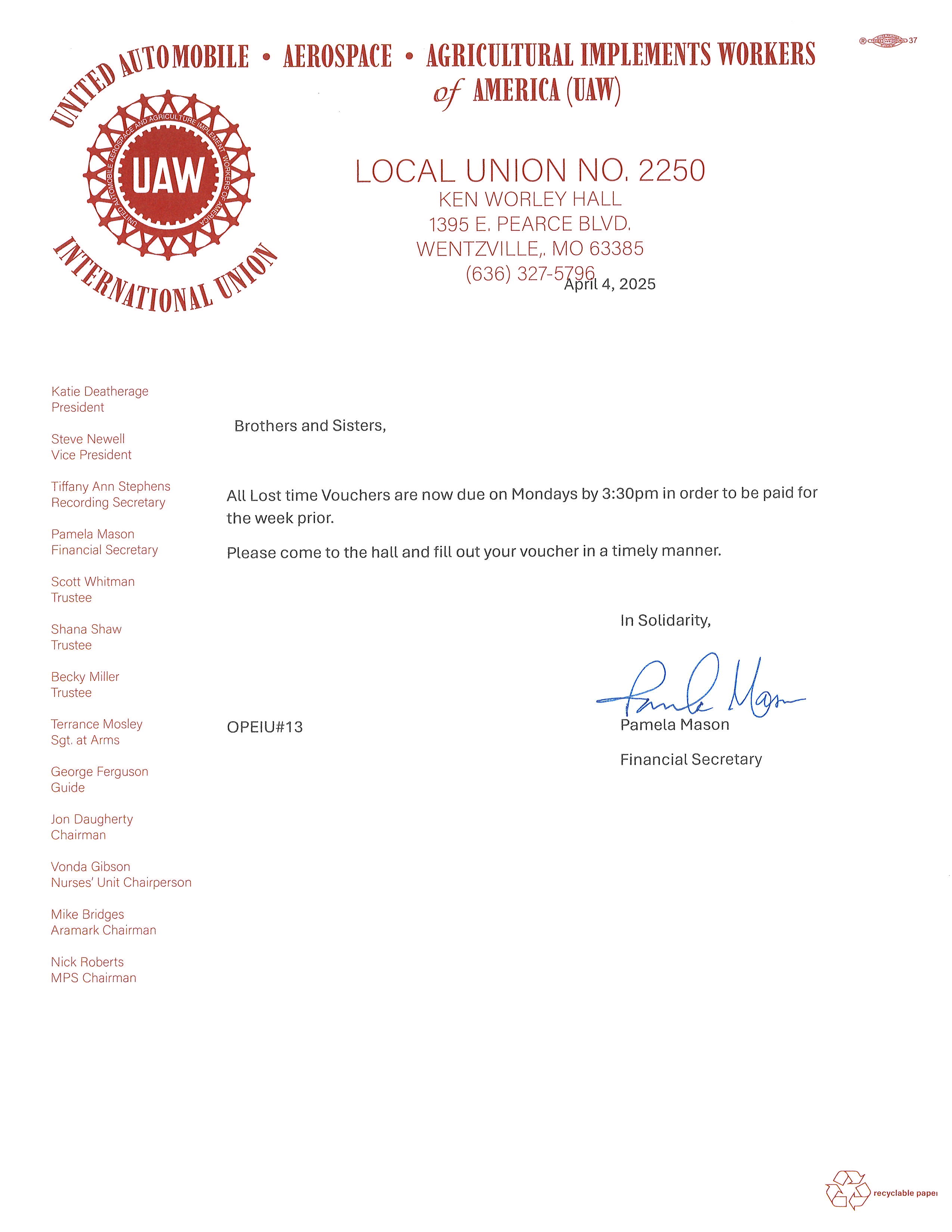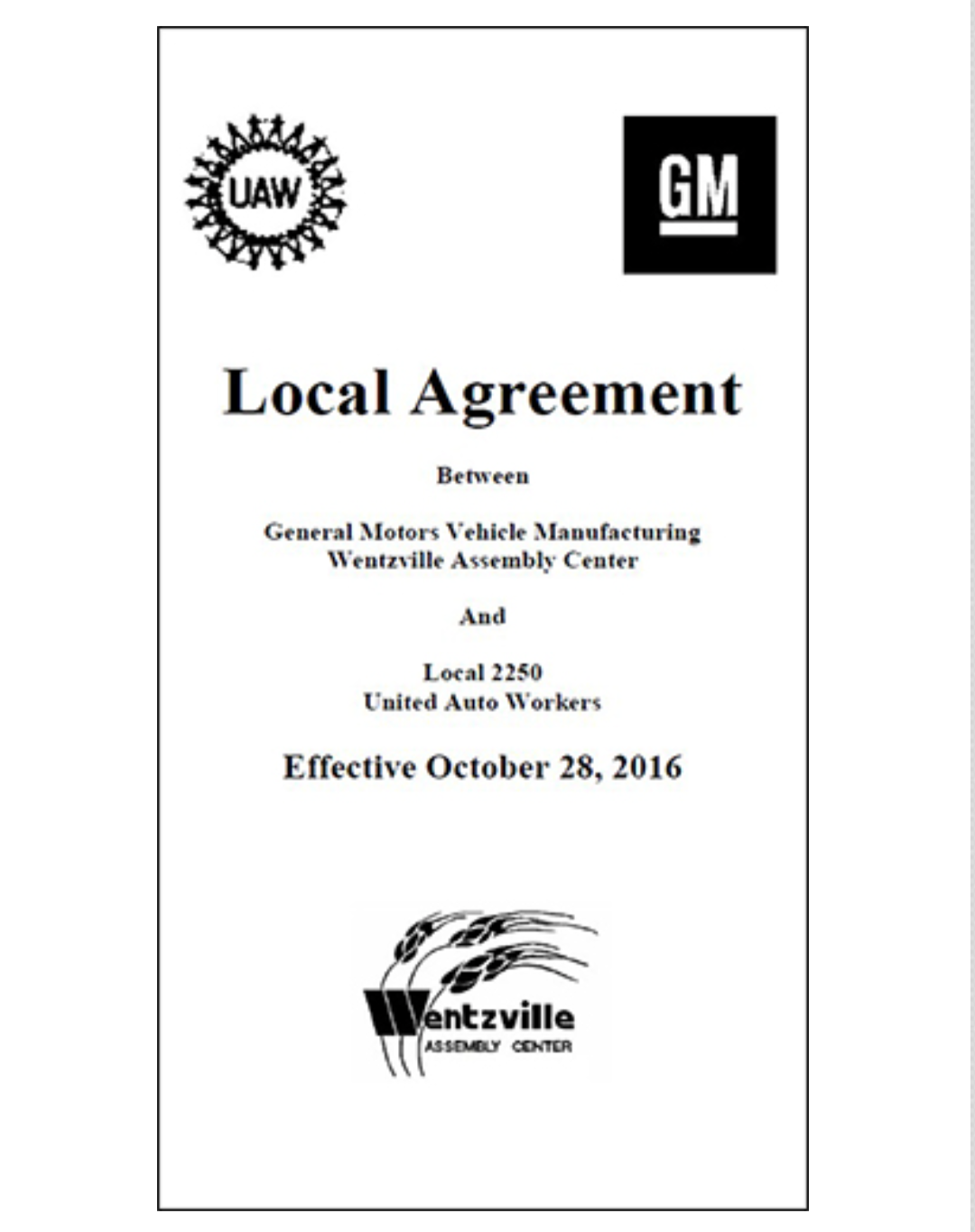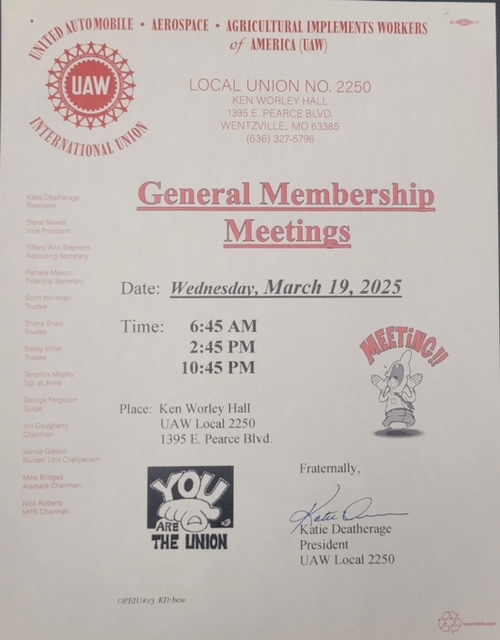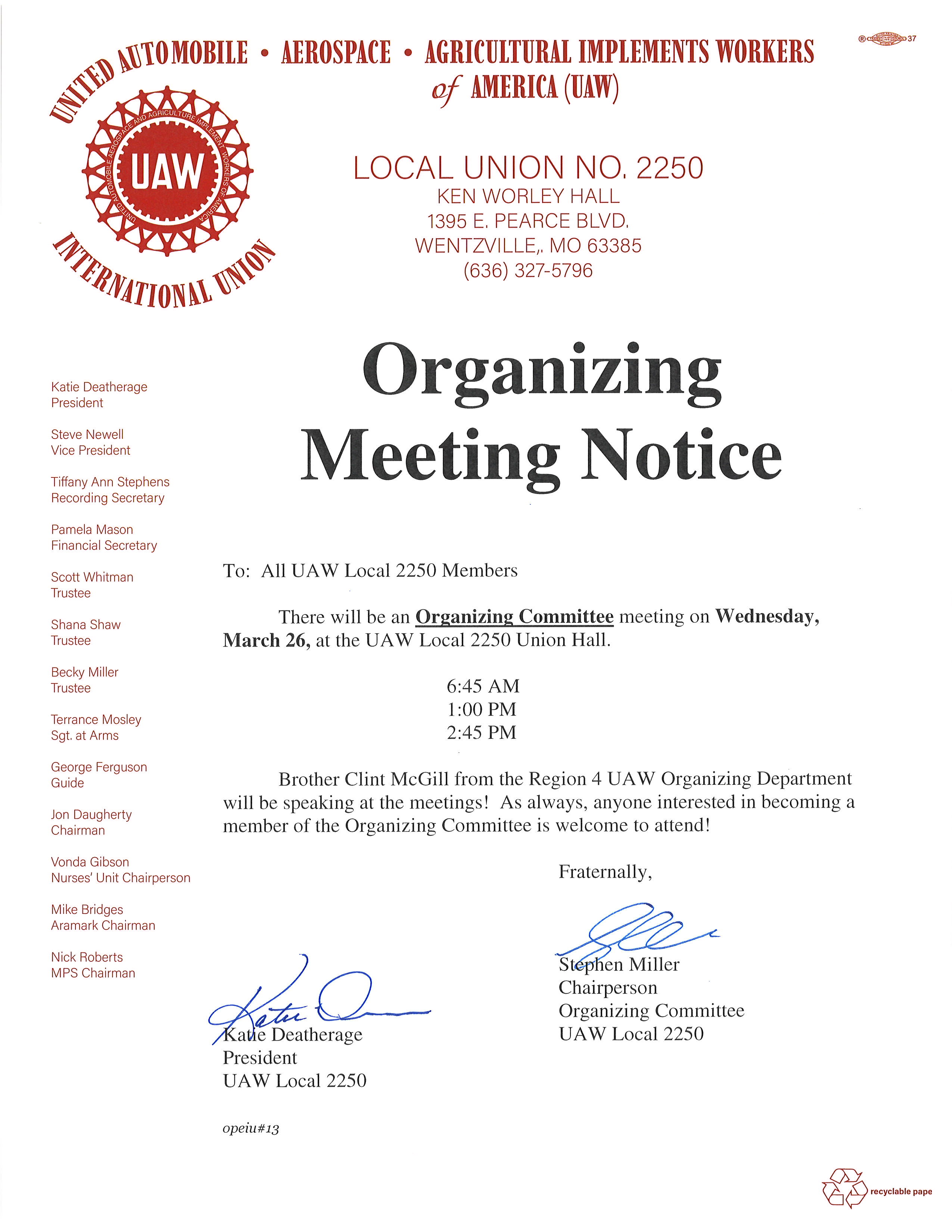-
A Note From The Financial Secretary - 4 hours ago
-
Look At This: Your 401k Will Be Richer In One Contract Than Most Americans - 20 hours ago
-
You Can Carry Your UAW/GM Wentzville Local Agreement 24-7-365 - April 1, 2025
-
Did Your Bid Win? - March 31, 2025
-
Shawn Fain, Trump, and Tariffs: What’s The Truth? - March 30, 2025
-
Guest Opinion: Lawmakers Shouldn’t Undermine Missouri Voters - March 29, 2025
-
April Showers Bring More Activities! - March 28, 2025
-
The 2025 Missouri AFL-CIO Joint Legislative Report - March 27, 2025
-
P2: Phased Retirement For Tier 2/Progressive Members – A New Trend? - March 23, 2025
-
Sunday Guest Opinion: Education Department Cuts Damage The Working Class - March 22, 2025
Hurt On The Job? What Happens? Missouri vs Illinois
There are several major differences in what happens when you get hurt on the job in Missouri versus Illinois. Workers Compensation Attorney Michael Goldberg spells it out…
Missouri has a lot going for it. Unless you get injured on the job. Then you might be wishing you lived in Illinois.
Every year, CNBC assesses state business climates, analyzing how welcoming states are to workers and their families. In 2023, America’s Top States for Business study ranked Missouri 32 out of 50, based on more than 86 different metrics in 10 key categories. The worst ranking for Missouri, 49 out of 50, was in the Workforce category. As a comparison, Illinois was ranked 17th overall, with its Workforce category coming in at 28. (1)
What the Workforce rankings show is this: Missouri is a pro-employer state and Illinois is a pro-labor state. This might not seem important, but this distinction has sometimes severe ramifications for workers, especially injured ones. When you’re hurt on the job in Missouri, you’re guaranteed to receive fewer benefits than your injured counterpart in Illinois. Since 2005, Missouri legislators have passed bill after bill designed to reduce the benefits you may receive if you’re injured on the job. In Illinois since 2005, legislators have consistently passed bills to support workers.
A work injury in Missouri or Illinois nets you four benefits: Medical care paid by the employer, money if you miss time from work, disability benefits if you suffer long term problems, and future medical care. Like most things in life, the devil is in the details. In Missouri, the employer chooses the doctor you see; you have no say in the matter. Seeing an unfamiliar doctor in this scenario often leads to less satisfying results, as most people don’t trust the doctor the employer picks. In Illinois, the injured workers select which doctor will treat them. While there are some limitations on who can be chosen, the fact the workers have a say leads to higher satisfaction and better results.
And then there’s the matter of how much you get paid while you’re off work.
Missouri, when calculating your average wage rate for your weekly benefit, only looks at your last 13 weeks of work. If you weren’t working as many hours during that time, your payments will reflect that lower wage. In Illinois, they look at the entire previous year to balance out the earnings ups and downs. The weekly benefit rate paid to injured Illinoisans is almost always higher.
That lower wage rate doesn’t just impact how much money you have. It also has an outsized effect on your disability rating after you’re released from care because Missouri caps the overall disability settlement you can receive.
One of the most important differences between the two states comes about when you sustain an injury that prevents you from returning to your job. In Missouri, your employer can simply fire you, and you receive no additional benefits. You’re viewed as damaged goods, and the law allows you to be tossed aside no matter how long you have worked for the employer.
In Illinois, the employer must provide vocational rehabilitation and training so that you’re able to work somewhere else. In addition, if you’re forced to take a lesser paying job, the former employer may have to pay a wage differential to take that into account. In Illinois, workers are valued and the way they’re treated reflects that.
It’s a frustrating situation for Missouri workers, but the situation can be changed if you’re willing to act. Work injuries aren’t political issues because they happen to everyone. Tell your friends about the situation. Most importantly, reach out to your legislators and tell them how poorly injured workers are treated in Missouri. Educate them as to how you are being treated. Put a face to the pain. It’s likely that many of the people in Jefferson City pay no attention to this issue and simply vote without understanding the harm they’re causing the workers of this state.
Stop letting big business insurance companies determine what you’re entitled to simply to save them money. It will not change until we educate the people in charge that the laws need to be fixed and allow the proper benefits to be paid to the injured employee. We aren’t asking for anything but fairness.
- https://www.cnbc.com/2023/07/11/americas-top-states-for-business-2023-the-full-rankings.html
Michael Goldberg is the owner of Michael C. Goldberg Law, L.L.C. His firm focuses on workers’ compensation, civil litigation, and labor law. Mike’s also a member of CWA Local 6300. Contact him at (314) 824-0350, mike@michaelgoldberglaw.com, or visit his website at michaelgoldberglaw.com.
Workers Compensation is a state issue. Your State Representative, State Senator, and Governor are key players in shaping these laws. When they ask for your vote, please ask them how they will protect YOU and your fellow workers.
(Image by Gerd Altmann from Pixabay)

